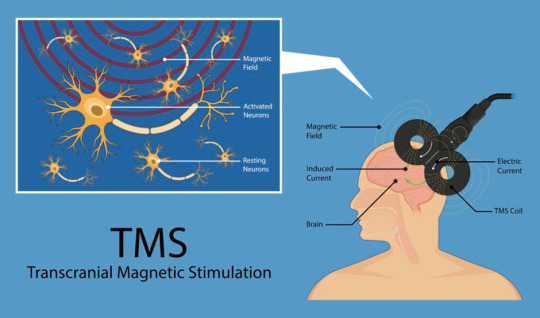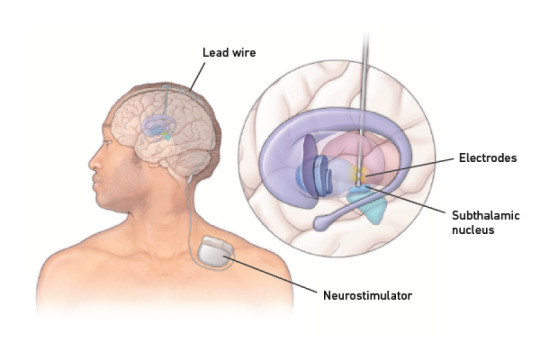#neuromodulation
Explore tagged Tumblr posts
Text
This feels weird to say but I feel like I'm possessed by a happy person 0_0 like because of the ect treatment, I actually feel so much better but it feels so unreal because I haven't felt okay in so long (like years) but now I suddenly am a person again?????
This is a message for all of you who feel like there's no hope, I swear it will get better someday
#like I've been struggling with mental illness my whole life#and now finally I feel better#like so much better#thank you ect treatment you saved me#i feel happy#even tho so much shit has happened in my life#but I survived#and you can too#thank you if you read this#mental illness#mental health#ect treatment#neuromodulation#hopecore#i wish you all the best#and hugs and kisses#if u want
137 notes
·
View notes
Text
Revolutionary RTMS Treatment: A Beacon of Hope for Mental Health in Hyderabad and Bengaluru
In the evolving landscape of mental health care, Repetitive Transcranial Magnetic Stimulation (RTMS) has emerged as a groundbreaking treatment, offering new hope to patients. With its growing popularity, RTMS treatment in Hyderabad and neuromodulation therapy in Bengaluru are now accessible to those seeking effective solutions for their mental health concerns.
Understanding RTMS Treatment
RTMS, or Repetitive Transcranial Magnetic Stimulation, is a non-invasive procedure that uses magnetic fields to stimulate nerve cells in the brain. This innovative treatment has shown significant promise in addressing a variety of mental health conditions, including depression, anxiety, and obsessive-compulsive disorder (OCD).
RTMS Treatment in Hyderabad
Hyderabad, known for its advanced medical facilities, is at the forefront of adopting RTMS treatment. Leading psychiatrists in Hyderabad are now offering this state-of-the-art therapy to patients who have not responded well to traditional treatments. The effectiveness of RTMS in treating depression and OCD has been particularly noteworthy.
Depression Treatment in Hyderabad: For many patients, conventional antidepressants and therapies do not provide the desired relief. RTMS offers a viable alternative, with many experiencing significant improvements in their symptoms.
OCD Treatment in Hyderabad: Obsessive-compulsive disorder can severely impact an individual's quality of life. RTMS treatment has been shown to reduce the intensity of OCD symptoms, providing patients with much-needed relief.
Neuromodulation Therapy in Bengaluru
Bengaluru, a city renowned for its technological advancements, is also a hub for innovative medical treatments. Neuromodulation therapy, including RTMS, is gaining traction among mental health professionals in the city.
Anxiety Treatment in Bengaluru: Anxiety disorders are among the most common mental health issues. Neuromodulation therapy offers a new avenue for treatment, especially for those who have not found success with traditional methods. Psychiatrists in Bengaluru are increasingly recommending this therapy for its effectiveness and minimal side effects.
The Role of Psychiatrists
The success of RTMS and neuromodulation therapy heavily relies on the expertise of the administering psychiatrist. In Hyderabad and Bengaluru, some of the best psychiatrists are now incorporating these treatments into their practice. Their knowledge and experience ensure that patients receive the most effective care tailored to their specific needs.
Benefits of RTMS and Neuromodulation Therapy
Non-Invasive: Both RTMS and other forms of neuromodulation are non-invasive, meaning they do not require surgery or anesthesia.
Few Side Effects: Compared to medications, these treatments have minimal side effects, making them a preferred option for many.
Effectiveness: Clinical studies have shown that RTMS can significantly reduce symptoms of depression, anxiety, and OCD, even in patients who have not responded to other treatments.
Conclusion
The advent of RTMS treatment in Hyderabad and neuromodulation therapy in Bengaluru marks a significant step forward in mental health care. With leading psychiatrists in these cities offering cutting-edge treatments, patients now have access to more effective and less invasive options for managing their mental health conditions. Whether it's anxiety treatment in Bengaluru or depression treatment in Hyderabad, RTMS and neuromodulation therapies are paving the way for better mental health outcomes.
If you or a loved one is struggling with depression, anxiety, or OCD, consider exploring these innovative treatments with a qualified psychiatrist. The future of mental health care is here, and it holds promise for a brighter, healthier tomorrow.
3 notes
·
View notes
Link
#Gesundheit#HolisticHealth#Intuition#Lebensstiloptimierung#Mentaltraining#Mitochondrien#Neuromodulation#PeakPerformance#Regenerationstechniken#Sportpsychologie
0 notes
Text
Great news! Anthem Blue Cross Blue Shield now covers this! I have found it to be a MAJOR help for migraine prevention, but kind of hit or miss for acute treatment. Sometimes it almost completely relieves a migraine, sometimes it gets rid of pain but not much else, and sometimes it just doesn't help much.
#nerivio#migraine#migraine treatment#neuromodulation#anthem blue cross blue shield#health insurance#health information#neuromodulation devices
0 notes
Text
Implants for migraine prevention
I’m conflicted by news of an implant for migraine care – it’s super exciting to think there might be another treatment option for those of us who struggle with chronic migraine…. but I’m also a little queasy about the idea of an implant in my head. [Disclaimer – as always – please remember to speak to a healthcare professional about medical queries – my blogposts are only my best understanding…
0 notes
Text
Attention-Worthy Links for December 22nd, 2024
#BCI#Neurotech#ALS#paralysis#neuromodulation#oaks#PETM#Quercus#temperate#Northern#Hemisphere#Southeast#sea#level#rise#NOAA#tides#Greenland#sinking#TikTok#Ban#Influencers#Extinction#dinosaurs#extinction#climate#volcano#meteor#Chicxulub
0 notes
Text
0 notes
Text
Reblog if you’re a modified human
Reblog if you're not human
15K notes
·
View notes
Text
Asha Neuromodulation Clinics (ANC), a unit of Vihanga Labs Pvt. Ltd, is India’s first multi-centered Deep TMS (dTMS) clinics. ANC is founded by Dr. M. S. Reddy, a leading psychiatrist and thought leader in mental healthcare in India. He pioneered the multi-centered clinical use of Deep TMS (dTMS) technology for treating psychiatric disorders in the country.
1 note
·
View note
Text
the new test implant works so well I can literally tell when it's lost connection from its remote (because I accidentally left it in the other room while distracted by whatever I'm doing, whoops) because The Symptoms will return and I'll start feeling like shit. And then Symptoms will go away again shortly after reestablishing the connection.
#health#disability#disability positivity#neuromodulation#medical implants#medical technology#bek speaks
3 notes
·
View notes
Text
Harnessing the Power of Neuromodulation: Transforming Behavioral Medicine
Curtis Cripe: The Rise of Neuromodulation in Behavioral Health
In recent years, there has been notable advancement in behavioral medicine with the introduction of neuromodulation techniques. These methods, including deep brain stimulation (DBS) and transcranial magnetic stimulation (TMS), offer new avenues for treating neurological and psychiatric conditions that were previously deemed challenging to manage. Curtis Cripe highlights an objective examination of the practical applications, benefits, and limitations of neuromodulation in the realm of behavioral medicine.

Understanding Neuromodulation:
Neuromodulation involves the targeted manipulation of neural circuits through electrical or magnetic stimulation to regulate brain function. This approach is particularly relevant for conditions where traditional therapies have shown limited efficacy, such as Parkinson's disease and major depressive disorder.
Deep Brain Stimulation (DBS):
DBS has emerged as a significant intervention for various neurological conditions. It has demonstrated effectiveness in alleviating motor symptoms in Parkinson's disease and providing relief for severe obsessive-compulsive disorder. Despite its invasive nature, DBS offers a customizable treatment option with reversible effects.
Transcranial Magnetic Stimulation (TMS):
TMS presents a non-invasive alternative to DBS and has gained recognition for its role in treating major depressive disorder and other psychiatric conditions. By targeting specific brain regions with magnetic pulses, TMS provides a well-tolerated outpatient treatment option, albeit with varying patient response rates.

Both DBS and TMS offer distinct advantages and challenges. DBS allows for precise and adjustable stimulation but entails surgical implantation and potential side effects. Conversely, TMS is non-invasive with minimal side effects, yet its efficacy may vary, necessitating maintenance treatments.
According to Curtis Cripe, Continued research and development in neuromodulation hold promise for further refining these techniques. Advancements in understanding neural circuitry, personalized treatment approaches, and improvements in device technology are poised to enhance outcomes and increase accessibility to neuromodulation therapies.
0 notes
Text
#neuromodulation#neuromodulation devices#migraine#migraine treatment#migraine relief#migraine prevention#health information
1 note
·
View note
Text
Cervical Dystonia: Understanding Treatment Options & Market Trends (2024 Update)
Everything about Cervical Dystonia! Explore treatment options, latest market trends, advancements, and top companies shaping the future of cervical dystonia management
Cervical Dystonia: A Look at the Market and Treatment Options Cervical dystonia, also known as spasmodic torticollis, is a neurological movement disorder characterized by involuntary contractions of the neck muscles. These contractions cause the head to twist, tilt, or turn to one side, often causing significant pain and discomfort. While the exact cause of cervical dystonia remains unknown, it…

View On WordPress
#botoxinjections#cervicaldystonia#cervicaldystoniaresearch#ClinicalTrials#dystatoniatreatment#dystonia#MedicalTechnology#neurologicaldisorder#neuromodulation#neurotoxin
1 note
·
View note